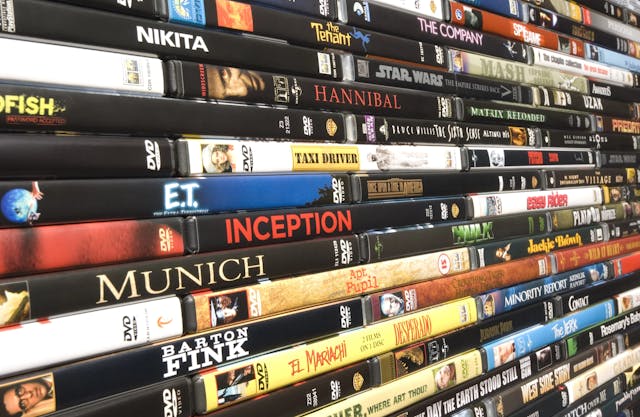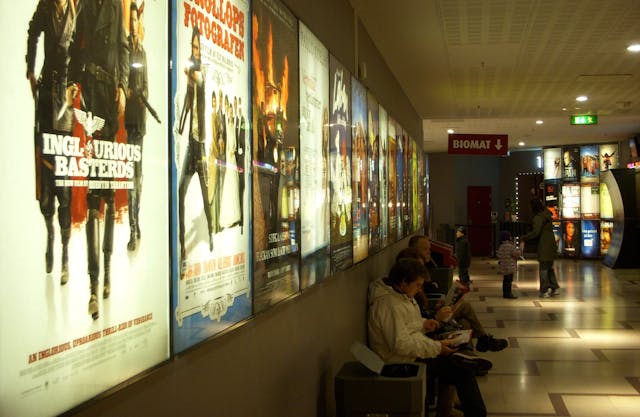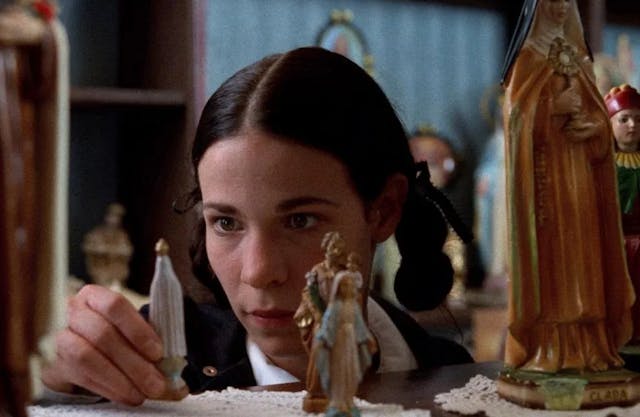
Winner's circle: Christopher Nolan and the "Oppenheimer" team pick up the 2024 Best Picture Oscar. / Photo by Trae Patton, courtesy of ©A.M.P.A.S.
The 96th Oscars are over, but we are not done with them. The hits, misses, and embarrassments linger in our minds. As you can tell by our predictions, it’s impossible to read the minds of the august members of the Academy. Out of 23 categories, we hit the spot on 14 and missed 9. Not a bad record! Here are the other things that occupied our minds as we sat down to enjoy the yearly ritual where Hollywood pats its collective back.
Oppenheimer Sweep Averted
Christopher Nolan’s wildly successful biopic failed to stage an outright sweep. It came with the most nominations, 13, and walked out with 7. Not too shabby, either. It took the most statuettes of any other film, including the biggest awards of the night, Best Picture and Best Director. Cillian Murphy took his well-deserved Best Actor Award, and Robert Downey Jr. gratefully received a Best Supporting Actor Oscar that amounts to an early career tribute. It’s hard to quibble with its other wins, even if my favorites were others: editing, cinematography, and production design were solid. Extra kudos to cinematographer Hoyte von Hoytema, who took advantage of his thank you speech to prop up shooting in film. This is why film nerds enjoy “Oppenheimer”’s success with critics and the box office. Nolan and his collaborators are clearly lovers of cinema. Yes, cinema. Call us snobbish; we don't care.

Producers Emma Thomas and Christopher Nolan pose backstage with their Best Picture Oscars for "Oppenheimer." Photo by Richard Harbaugh, courtesy of ©A.M.P.A.S.
"Poor Things" Uprising
One of the biggest surprises of the night was the strong showing of support for “Poor Things.” Yorgos Lanthimos’ fanciful fable of female empowerment won many craft-related awards, and it’s easy to see why. It has the most make-up, the wildest wardrobe, and an eccentric production design. Oscar is well known for favoring obviousness over subtlety. It goes for acting, as well as the material elements that make a movie. The movie turned out to be the second biggest winner of the night, with 4 wins out of 11 overall nominations. The tally includes the biggest upset of the night.

Poor thing: Emma Stone is in as much shock as everybody else, for winning the Best Actress Oscar over favorite Lily Gladstone. / Photo by Trae Patton, courtesy of ©A.M.P.A.S.
Lily Gladstone was Robbed
Poor Emma Stone was visibly shaken when her name was announced as the winner of the Best Actress in a Leading Role Oscar. It’s obvious that she, as well as us, was convinced that Lily Gladstone should have been on that podium thanks to her heartbreaking turn as Molly Burkhardt in Martin Scorsese’s “Killer of the Flower Moon.” Stone gave a dating, uninhibited performance, but again, it works as evidence that the Academy values slowness over subtlety. Gladstone would have been the first Native American actor to win an Oscar. It would have been a nice headline, but her worthiness does not come from a commitment to political correctness. Her performance is a marvel of emotional transparency.
The saddest part is that, following Hollywood’s record, it is unlikely that she will ever get another role like this one in a movie of such scope. Stone, on her part, will not have to face a drought of opportunities. Again, this is not necessarily her fault, but the Academy’s decision puts her on the spot. Through no fault of her own, she is the white woman who crashed the party and prevented a historical win.

Once the dust settled: Martin Scorsese and his "Killers of the Flower Moon" star Lily Gladstone after the Oscar Ceremony. / Photo by Dana Pleasant courtesy of ©A.M.P.A.S.
They Really Hate Scorsese, hum?
Speaking of Gladstone and “Killers of the Flower Moon,”…Martin Scorsese’s historical epic was the third movie with the most nominations and lost every single one of them. Like the “Oppenheimer” win, this was a foregone conclusion. It’s the same outcome the director experiences with “The Irishman” (2019): ten nominations, zero wins. Things get worse if you go further back: “Silence” (2016) lost its single nomination for Best Cinematography. “The Wolf of Wall Street” (2013) had five nominations and zero wins. You have to go 13 years in the past, to “Hugo” (2011) to find straightforward recognition for a movie by Scorsese. It won 5 Oscars out of 11 nominations, and even then, lost Best Directing and Best Picture. Won won? Michel Hazanavicius, for “The Artist (2011). As far as love letters to cinema go, we can say the Academy chose the lesser one.
The animosity towards “Killers of the Flower Moon” was felt in host Jimmy Kimmel’s silly joke about the length of the movie. Yes, “Killers…” has a running time of 3 hours and 30 minutes, but one could say the subject matter and the story demanded epic treatment. Heck, Thelma Schoonmaker’s stellar editing made it feel shorter than your standard superhero blockbuster and much more engrossing. The good news is that Scorsese, and Gladstone for that matter, really do not need an Oscar to go on. Here’s hoping that even if Hollywood does not come through for Gladstone, indie filmmakers give her the opportunities her talent deserves,
"Barbie" Dreams Dashed
If you were angry because Greta Gerwig did not achieve a Best Director nomination, you must be beyond the pale after last night. Everybody loved “Barbie,” but not enough to take it seriously. It won just one Oscar out of 8 nominations, and even that small triumph was marred by miscalculation. The award was handed out to the wrong winner. The movie had two songs competing in the Best Original Song nomination. Ryan Gosling’s show-stopping live performance of “I Am Ken” left no doubt that this was the worthy winner of the night. The stellar staging of the number mined old Hollywood glamour and played off the themes of the movie, reformulating “Diamonds are a Girl’s Best Friends,” switching Marylin Monroe for Gosling, with winks at Busby Berkley. Even some supporting actors from the movie were at hand to reprise their Ken roles, like Sims Liu and Kingsley Ben-Adir.

Oscars are a material boy's best friends: Ryan Gosling wins the night, not the prize, with the musical number "I'm Just Ken." / Photo by Phil McCarten, courtesy of ©A.M.P.A.S.
Who did the Academy choose? Billie and Finneas Eilish’s boring ballad “I Don’t Know What I Was Made For.” The damned thing could have been written by perennial nominee Diane Warren or play over the credits of any generic rom-com. The millennial music star now has two Oscars after winning for their James Bond theme “No Time To Die” (2022).
Worldly Oscars
Five of the big winners of the night are international movies that defy the insular tradition of the Oscars. Gone are the days when the most exotic nominee would be a Brit, an Aussie, or the odd European star who everyone knew had a slim or null chance of winning over local boys and girls. Five movies took statuettes, and not just in the International movie category. “The Zone of Interest” took the one award parceled out that award and Best Sound. France’s “Anatomy of a Fall” earned the Best Original Screenplay. Japan hit a double whammy with Best Animated Feature for Hayao Miyazaki’s “The Boy and the Heron” and Best Special Effects for “Godzilla Minus One.”

Where is Messi?: Arthur Harari and Justine Triet receive the Best Original Screenplay Oscar for "Anatomy of a Fall" / Photo by Trae Patton, courtesy of ©A.M.P.A.S.
Check out the Best Documentary Feature category, where all the nominees came from abroad: the winner, “20 Days in Mariupol,” straight from war-torn Ukraine, “Bobi Wine: The People’s President” from Uganda; “Four Daughters” from Tunisia. “The Eternal Memory,” from Chile - the sole Latin American production that entered the 2024 Oscars - and To Kill A Tiger,” from India. The three last were directed by women. It remains to be seen if this is an oddity or if it will turn into a trend.
Shadows of Wars
In spite of the “don’t mix art with politics” contingent, some of the most riveting moments in Oscar history have to do with artists reacting to news-worthy events or historical conflicts. There’s Marlon Brando, sending Sacheen Littlefeather to pick his Best Actor in a Leading Role Oscar in 1973 to call attention to the genocide of Native Americans. Vanessa Redgrave decried “zionist hoodlums” when she picked the Best Supporting Actress Oscar for “Julia” (1977). Ed Harris and Amy Madigan visibly did not clap when Elia Kazan received his 1999 Honorary Award - remember, the “On The Waterfront” filmmaker named names when interrogated in 1952 by the House of Unamerican Activities Committee amid the Red Scare -. Michael Moore won the Best Documentary Award for “Bowling for Columbine” (2002) and used his thank-you speech time to decry the contested election of George W. Bush and the Iraq war to a chorus of boos.
This year, the Academy stages its pageantry as two armed conflicts send tremors around the world. First, there’s Russia’s invasion of Ukraine. With “20 Days of Mariupol” winning the award for Best Documentary, the moral failure of Republican lawmakers who vacillate over supporting their natural ally comes to the forefront. That former president and virtual Republican nominee Donald Trump openly courts Vladimir Putin’s favor and hints at cutting off aid to Ukraine, if he wins the 2024 elections, shows how far American conservatives are from supporting Democracy around the world.

Straight from the war zone: journalist Mstyslav Chrenov and producer Michelle Mizner won Best Documentary Feature for "20 Days in Mariupol." / Photo by Phil McCarten, courtesy of ©A.M.P.A.S.
Journalist Mstyslav Chernov was covering the war for international news agencies when Russian troops surrounded Mariupol. He and his team of collaborators decided to stay and continue covering the conflict at great personal peril. The resulting documentary, “20 Days in Mariupol,” deservedly took the Best Documentary Feature Award. It should be mandatory viewing for all the politicians dragging their feet just to appease Trump. Chernov struck a somber note upon receiving the Oscar.
Israel’s ongoing campaign against Gaza, in the aftermath of the October 7th terrorist attack by Hamas, has divided Hollywood. Stars supporting a cease-fire sported red pins in their lapels, but few, if not none, got to make verbal statements during airtime. It fell on Jonathan Glazer to make the clearest, most eloquent call for peace when he took the stage to accept the Best International Film Oscar for directing “The Zone of Interest.”

Producers James Wilson and Leonard Blavatnik look upon "The Zone of Interest" director Jonathan Glazer as he reads his statement against the war in Gaza. / Photo by Trae Patton, courtesy of ©A.M.P.A.S.
Some media outlets have misquoted and misconstrued Glazer’s speech to cloud its message, but during the live broadcast, the applause was evident. Roger Ebert said movies are a machine that generates empathy. Politics aside, that is why filmmakers can’t—and shouldn’t—be indifferent to suffering anywhere in the world.
Those brave artists taking a clear stand against war contrast with the bizarre silence by the winners of the Best Animated Short Films. Dave Mullins and Brad Booker, with Producer Sean Ono Lenon in tow, took the stage to receive their Oscar for "War Is Over!" - the movie is inspired by John Lenon and Yoko Ono's classic song "Give Peace a Chance."
How do you make a pacifist movie without addressing the wars monopolizing the news? Well, like these guys did. They thanked their colleagues and their families. Ono Lenon managed to squeeze a "Happy Birthday" from the crowd for his mom since Yoko was 91 on March 10th. Oh, and also a "Happy Mothers' Day, since it was Mother's Day in the U.K. What about Gaza or Ukraine? Not a word. Now, ask yourself, what would dad John would have done?
Please, Don't Present Acting Awards Like this Ever Again!
Let’s wind down on a lighter note. A few days ago, the Academy celebrated the return to an alleged “beloved” format to present the Acting awards. Five Oscar winners come on stage, and each one speaks to a single nominee and compliments his or her talent. I think the only people who loved this format were the ceremony’s producers. It’s maudlin, cringe, and mildly embarrassing. Everybody looks uncomfortable. No amount of acting talent can make the obviously scripted compliments sound natural. Worse yet, the pageantry takes a lot of time in a ceremony with an already bloated running time. Can we go back to running clips of scenes from the actual movie? You have one year to think about it, Academy!

Winner's lineup" Robert Downey Jr., Da'Vine Joy Randolph, Emma Stone, and Cillian Murphy celebrate their Oscar wins backstage. / Photo by Michael Baker, courtesy of ©A.M.P.A.S.
Truthers for Messi the Dog
The biggest star of the 2024 Oscar race is, undoubtedly, Messi, the dog. The feisty Border Collie who graced “Anatomy of a Fall” with its presence took place next to Ron Tin Tin, Lassie, Asta, and the great dogs of Cinema. He was deployed as the secret weapon of the movie’s campaign, attending events such as the Nominees Luncheon and stealing camera time everywhere.
A couple of days before the ceremony, news reports revealed studios competing with the French release distributed states-side by Neon allegedly demanded the dog were not admitted to the ceremony. Allegedly, Messi could give advantage to the movie by charming voters. But when people tuned in for the telecast, there was Messi on a seat, providing charming reactions. The whole thing reeks of a stunt. After all, by the time the ceremony takes place, the votes have been cast, and the winner's names are already printed on the envelopes. Plus, social media posts revealed Messi filmed his appearance before the ceremony, with a few extras clad in suits and gowns seated around him. The shots were then inserted into the live telecast.
It’s all in good fun. Now, can somebody cast Messi soon, so that we get him in the ceremony next year?
All The Winners
Without further due, here is the complete list of the 2024 Oscar Winners. Have you seen them all, movie buff?
Best Picture: “Oppenheimer.”
Best Director: Christopher Nolan, “Oppenheimer.”
Best Actor in a Leading Performance: Cillian Murphy, “Oppenheimer.”
Best Actress in a Leading Role: Emma Stone, “Poor Things.”
Best Actor in a Supporting Role: Robert Downey Jr., “Oppenheimer.”
Best Actress in a Supporting Role: Da’Vine Joy Randolph, “The Holdovers.”
Best Cinematography: Hoyte Van Hoytema, “Oppenheimer.”
Best Editing: Jennifer Lame, “Oppenheimer.”
Best Score: Ludwig Goransson, “Oppenheimer.”
Best Original Song: Billie and Finneas Eilish, “What Was I Made For?” from “Barbie.”
Best Sound: Tarn Willers and Johnnie Burn, “The Zone of Interest.”
Best Production Design: James Price, Shona Heath, Zsuzsa Mihalek; “Poor Things.”
Best Makeup and Hairstyling: Nadia Stacey, Mark Coulier, and John Weston, “Poor Things.”
Best Costume Design: Holly Waddington, “Poor Things.”
Best Original Screenplay: Justine Triet and Arthur Harari, “Anatomy of a Fall.”
Best Adapted Screenplay: Cord Jefferson, “American Fiction.”
Best Special Effects: Akashi Yamazaki, Kiyoko Shibuya, Masaki Takahashi, Tatsuji Nojima, “Godzilla Minus One.”
Best Documentary Feature: Mstylslav Chernov, Michelle Milner, and Raney Aronson, “20 Days in Mariupol.”
Best International Feature Film: Jonathan Glazer, “The Zone of Interest.”
Best Animated Feature Film: Hayao Miyazaki and Toshio Suzuki, “The Boy and the Heron”
Best Animated Short Film: Dave Mullins and Brad Booker, “War is Over!”
Best Live-Action Short Film: Wes Anderson and Steve Rales, “The Wonderful Story of Henry Sugar.”
Best Documentary Short Film: Ben Proudfoot and Kris Bowers, “The Last Repair Shop.”
Watch “Lonely”
“Lonely” is a powerful reminder that no one is ever truly alone, and there is always someone out there who cares and wants to help.
Stream NowWant to get an email when we publish new content?
Subscribe today




























